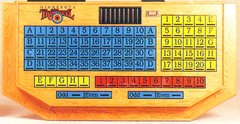Minnesota Electronic Wheel Bills Are Filed - HF0356 & SF0512
This legislation does not pass without your support in contacting you Representative and Senator.
Find who represents you
HERE
Remember, electronic wheels were authorized in MN during the 2012 session. But, the paper ticket procedures for wagering were untouched and when you added the cost of a paper ticket with each and every wager along with the electronics, they were made far too expensive and still too cumbersome for many to operate.
Thank you
Representative Ben Lien &
Senator Koran for sponsoring this legislation
Allied Charities of Minnesota Endorsed
We thank Allied Charities of Minnesota for their continued endorsement of attempts to modify the ticketing/wagering process for paddle wheels that, while keeping existing wheel operations the same as they are now, would effectively allow us to efficiently launch electronic wheels and tables .... in many cases bringing Tri-Wheel® up to the 21st century. The existing wheel and table is very expensive both in consumption of a 4¢ ticket with each wager and in controlling the secured inventory of tickets as well as it is less secure and efficient while also being less attractive to the newer generation. No new table has been produced in the past 25 years! That's right, any table you see is over 25 years old and while we feel quite satisfied that they have lasted that long in a bar environment, we know they are dying away. With them goes the only social table game in the charitable gaming portfolio. And, it is the social attributes of table games that are attractive to the newer, younger, players.
All other game types in Minnesota have functioning electronic adaptations
What the MN legislation proposed in 2019 does:
1. Can reduce your effective gaming tax rate.
For every dollar, after prize payout, you realize from wheel games, you bring down your overall effective tax rate. Wheel games are taxed at 8.5% of gross win. The quantity of organizations reaching the tax rate of 36% from operation of electronic pull tabs. Thus, organizations need lower tax games to buoy the amount they deliver to their charitable operations. If you have pretty hot sites, you really can benefit your overall organizational fundraising with wheel games.
2. Reduces expensive paper consumed with each and every wager.
Allows a one-ticket-many-bet format. For wheels without a table, the bill allows consolidation of all of a players wagers for up to 10 consecutive spins on one ticket. This system is far easier to regulate and allows for increased accuracy in payouts, timely and remote reporting and vastly decreases the time taken in counting and tallying individual paper tickets. Reduces paper on table wheel games to one ticket per gaming session.
3. Central control of graphic spins and resolutions while collecting all statewide wheel accounting.
For wheels not using tables, all such wheels of same type statewide spin to the same resolution every four or five minutes. They are passive-style games that operate in the background. Thus people can "party-play" so that a table of people can pool their wager and play while visiting - not intensely consuming. The central computer tracks all activity across the state and warns of anomalous activity in near-real-time.
4. Prize limit becomes associated with each wager and not each ticket.
Places a very standard (common to charitable gaming games) prize limit on each wager instead of each paper ticket. This is an important change in order to facilitate the reduction in paper by having multiple wagers on a ticket rather than a ticket for each wager.
5. Real human wheel operators still required to operate each table.
Where else can you sit down and meet people you may never otherwise come in contact with while cheering and booing the resolution of a graphically revolving wheel? It's fun. It's social. It's entertainment. Wheel operators help players understand how to play while also assisting in keeping a positive playing atmosphere among the players. This is not an introverted individual gaming terminal.
6. Allows the use of symbols in addition to numbers on a wheel.
Why should wheels have only numbers? No functional reason. The Pig Wheel™ in North Dakota is widely played. Players love cheering or booing the five individual pigs. We can expand on that entertainment in Minnesota....
7. Provides the Minnesota Gambling Control Board greater regulatory authority.
While electronic wheels were authorized in the 2012 MN legislative session, the state's tribes have kept any required additional legislation that would provide reasonable regulatory control and functional control of the game from ever being heard in a legislative committee. The technical language that breathes life into the operation of the 2012 authorized wheels is needed.
What the legislation doesn't do:
1. Does not authorize electronic simulated paddle wheels. Those are already allowed in statute.
2. Does not change the current conduct of existing wheel games.
3. Does not authorize, in any form, player activated wheel or gamingdevices.
No individual terminals. These remain entertaining and social multi-player games.





.png)









